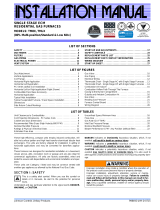
7
GENERAL INFORMATION
This furnace has been designed and built to
provide many years of safe and dependable
home comfort, providing it is properly installed
and maintained. With regular maintenance, this
furnace will operate satisfactorily year after year.
Abuse, improper use, and/or improper mainte-
nance can shorten the life of the furnace and
create hazards for you. Please read this manual
carefully to familiarize yourself with operation,
maintenance, and safety procedures for this
furnace.
A regular service and maintenance schedule
should be established to insure efficient and
safe operation of the furnace. See Section 5 for
maintenance procedures and schedules.
Devices attached to the flue or vent for the
purpose of reducing heat loss up the chim-
ney have not been tested and have not
been included in the design certification
of this furnace. We, the manufacturer, can
not and will not be responsible for injury
1. Safety Information
The furnace area and the vicinity of any other
gas appliance must be kept clear and free of
combustible materials, gasoline, and other
flammable vapors and liquids. Do not store or
use flammable items such as paint, varnish, or
strippers in the vicinity of the furnace.
Do not use the furnace closet or area next to the
furnace as a storage area. This area must be
kept clear, clean, and free of lint. The furnace
must also be kept clear of loose or exposed
insulation materials. Examine the furnace area
when the furnace is installed or when insulation
is added. Some insulation materials may be
combustible.
For proper and safe operation, the furnace
needs air for combustion and ventilation. Do not
block or obstruct air openings on the furnace, or
any air openings where the furnace may be
installed, including any surrounding spaces.
Should the gas supply fail to shut off or if
overheating occurs, shut off gas valve to the
furnace before shutting off electrical supply.
Do not use this furnace if any part has been
under water. A flood-damaged furnace is
extremely dangerous. Attemps to use the
furnace can result in fire or explosion. A qualified
service agency should be contacted to inspect
the furnace and to replace all gas controls,
control system parts, electrical parts that have
been wet or the furnace if deemed necessary.
Familiarize yourself with the controls that shut
off the gas and electrical power to the furnace.
If the furnace is to be shut down for an extended
period of time, turn off both the gas and electrical
power. For your safety always turn off both the
gas and electrical power before performing
service or maintenance on the furnace.
2. Combustion Air Supply
A furnace needs an adequate supply of
combustion and ventilation air for proper and
safe operation. Follow the installation
instructions included with the furnace to
properly vent air to the combustion air inlet
and exhaust the products of combustion to
the outside from the exhaust vent.
For 90+ Models: If the furnace is operated with
a restricted combustion air supply, the pressure
switch will open, turning off the gas supply to the
burners. (See Figures 2 and 3). DO NOT install
a jumper wire across this switch to defeat its
function. If this switch must be replaced, use
only the replacement part specified in the
Replacement Parts List.
For 80+ Models: If the furnace is operated with
inadequate combustion air supply, the flame roll-
out control switch located above the burners may
open, turning off the gas supply to the burners.
The flame roll-out control is a manually resettable
device (See Figure 1 and 4). DO NOT install a
jumper wire across this switch to defeat its function.
DO NOT reset the control without identifying and
correcting the fault condition which caused the
control to trip. If this switch must be replaced, use
only the replacement part specified in the
Replacement Parts List.
Air openings in warm air registers, and return air
grilles must not be restricted.
!
CAUTION:
Combustion air must not be drawn
from a corrosive atmosphere.












